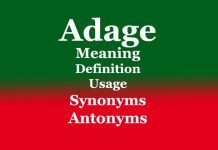Paralipsis | Paralipsis-Definition, Meaning, Examples & Illustration
Paralipsis | Paralipsis-Definition, Meaning, Examples & Illustration
Paralipsis | Paralipsis-Definition, Meaning, Examples & Illustration
Paralipsis is a figure of speech in which a speaker or writer professes to omit all mention of a subject that he really wants to emphasize. To say in other words, Paralipsis is a way of denying or pretending to deny what has already been spoken. Examples:
- I come to bury Caesar, not ‘to praise’ him. –Shakespeare (‘Julius Caesar, Act III, Scene II)
Here Antony really wants to emphasize what he professes to omit (i.e. to praise Caesar).
- I speak not to disprove what Brutus spoke
But here I am to speak what I do know.
- I will not do them wrong: rather I choose
To wrong the dead, to wrong myself and you.
- I know who did it, but I won’t mention Rasel’s name (the person has already mentioned the name).
- I will speak only about his good nature (implies that the person certainly has a bad side).
- I need not mention that everything should be done within the deadline. 0 0 0.
Paralipsis-Definition
Read More: Simile Meaning, Definition, Illustration
Paralipsis-Definition
N. B. The article ‘Paralipsis | Paralipsis-Definition, Meaning, Examples & Illustration‘ originally belongs to the book ‘The Rhetoric‘ by Menonim Menonimus.
Related Search:
- Definition and Examples of Paralipsis
- Paralipsis-Examples
- Asyndeton-Definition and Examples
- Definition and Examples of Asyndeton
- Chiasmus-Figure of Speech
- Chiasmus-Definition and Examples
Books of Composition by M. Menonimus:
- Advertisement Writing
- Amplification Writing
- Note Making
- Paragraph Writing
- Notice Writing
- Passage Comprehension
- The Art of Poster Writing
- The Art of Letter Writing
- Report Writing
- Story Writing
- Substance Writing
- School Essays Part-I
- School Essays Part-II
- School English Grammar Part-I
- School English Grammar Part-II











